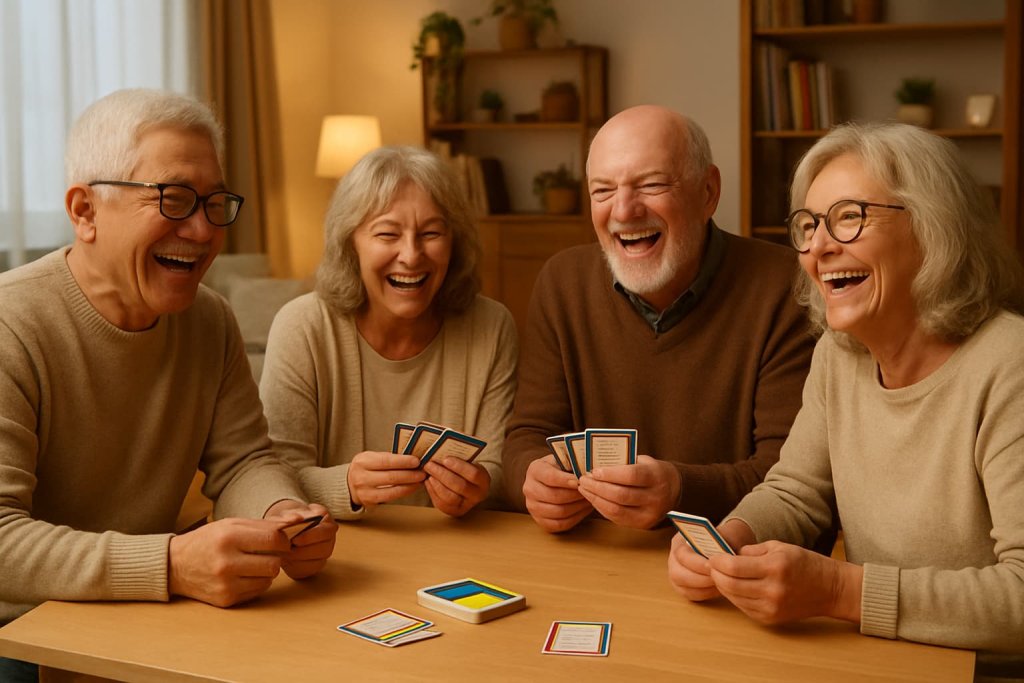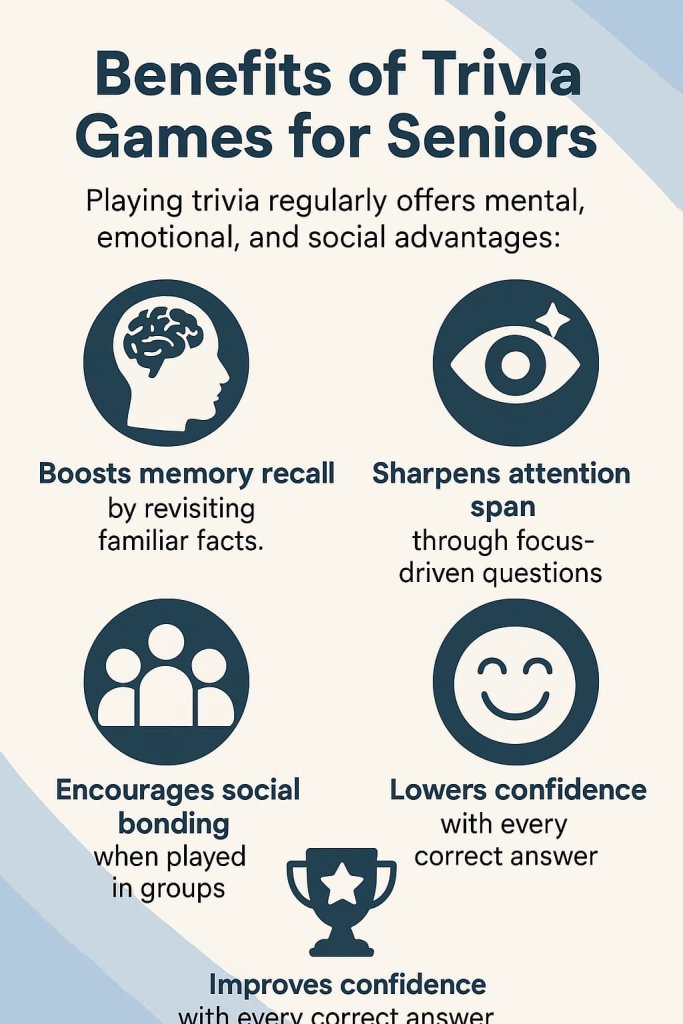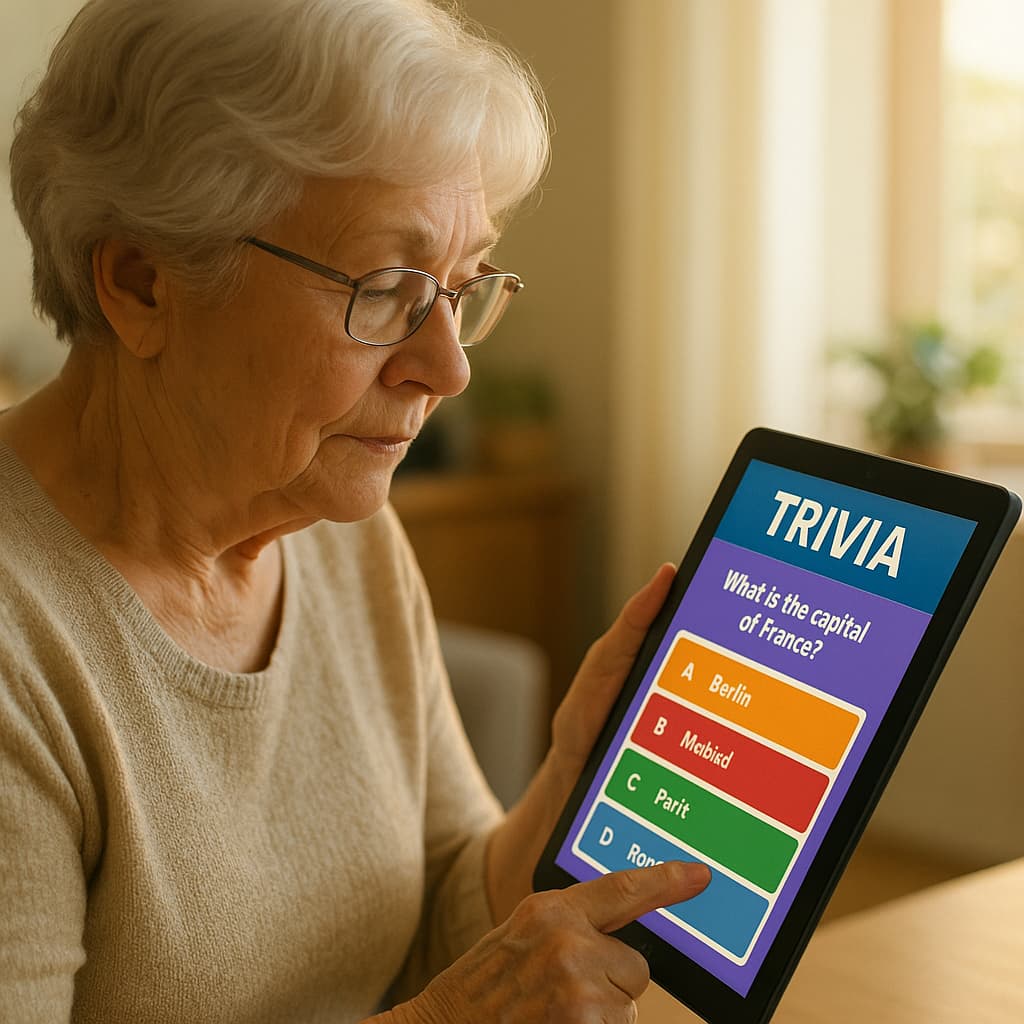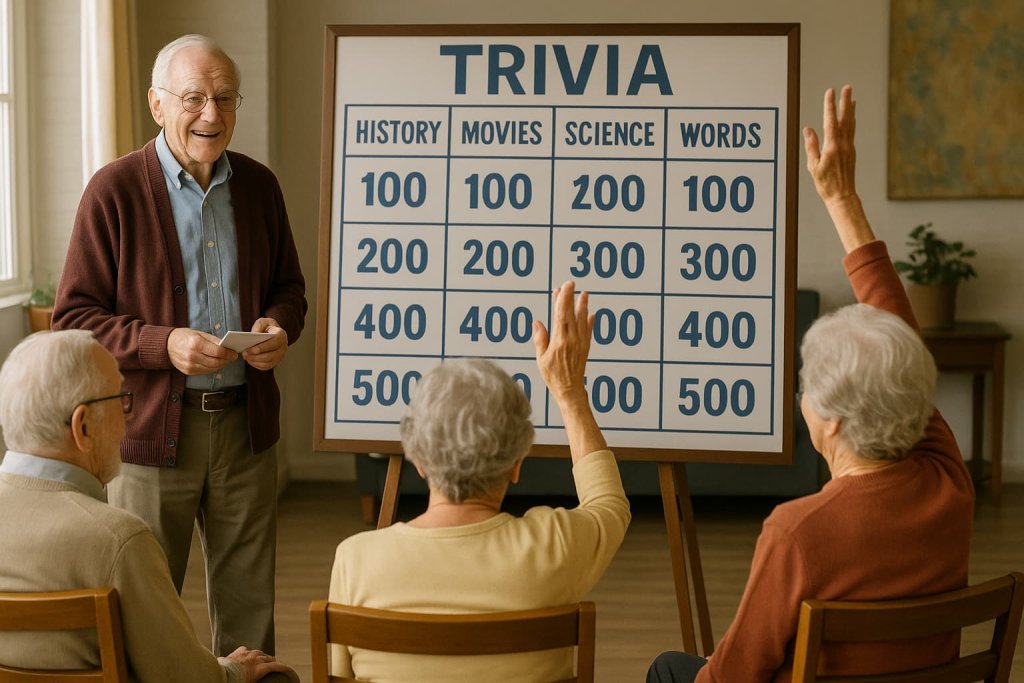Trivia games for seniors are one of the best ways to boost memory, improve focus, and encourage social interaction. These simple yet stimulating activities keep the brain active while creating fun moments with family, friends, or peers.

Understanding trivia’s value is important because it blends entertainment with brain health. Seniors can enjoy printable quizzes, classic board games, or even digital trivia apps tailored to their abilities. Options range from lighthearted music or movie questions to more challenging history and science quizzes.
In this guide, we’ll cover the best trivia games for seniors, including printable resources, game-show formats, online platforms, and practical hosting tips.
Benefits of Trivia Games for Seniors

Playing trivia regularly offers mental, emotional, and social advantages:
- Boosts memory recall by revisiting familiar facts.
- Sharpens attention span through focus-driven questions.
- Encourages social bonding when played in groups.
- Lowers stress by providing fun and laughter.
- Improves confidence with every correct answer.
For official brain health guidelines, see the National Institute on Aging and Alzheimer’s Association resources.
Printable Trivia for Seniors
Printable quizzes are a practical and accessible option, especially for community centers and at-home fun.
- Maria’s Place: Offers 70+ printable quizzes covering proverbs, true/false questions, and word puzzles (Maria’s Place).
- LoveToKnow: Provides 145+ free trivia questions with easy and difficult levels (LoveToKnow).
- Decade-Based Trivia: History and pop culture quizzes sorted by decades, such as the 1950s or 1980s, ideal for memory recall. 👉 To explore, go to Decade-Based Trivia Questions.
Tip: Print large-text versions for better readability.
Digital Trivia Platforms for Seniors

Technology has made trivia more engaging and accessible than ever. Seniors can now enjoy interactive games online or through apps, whether playing solo, with family, or in community groups. Here are some of the best digital trivia platforms:
Sporcle
Sporcle is one of the world’s largest online trivia libraries, offering more than 1.6 million quizzes in categories like history, geography, movies, and music. Seniors can take timed challenges, join live competitions, or play casually.
Go to Sporcle
Trivia Crack
This popular mobile app has millions of downloads and is loved for its colorful, easy-to-use interface. Seniors can compete with friends and family across categories such as Entertainment, Science, and History.
Click here for Trivia Crack
AARP Right Again! Trivia
Created for older adults, AARP’s Right Again! Trivia offers daily brain teasers and fun knowledge games that support mental fitness. It’s free to play and backed by a trusted organization.
Click here for AARP Trivia
TriviaMaker
TriviaMaker is a flexible platform that lets you create your own trivia games in formats like Jeopardy or Family Feud. It’s ideal for caregivers, activity leaders, or family game nights.
Go to TriviaMaker
Classic Trivia Game Formats

Seniors often enjoy trivia games modeled after familiar game shows, because these formats spark nostalgia, excitement, and friendly competition. Many seniors grew up watching these shows, so recreating them in group settings creates both fun and comfort. Here’s a closer look at some of the most popular trivia styles:
1. Jeopardy!
- How It Works: Players answer questions (called “clues”) arranged by category and difficulty level, earning points for correct answers.
- Why Seniors Love It: The category-based format makes it easy to include history, music, geography, or movies that seniors already know well.
- Hosting Tip: Use a whiteboard or PowerPoint slide with categories listed. Divide participants into small teams to encourage collaboration.
👉 Jeopardy works especially well for senior centers, since it balances competitiveness with teamwork.
2. Who Wants to Be a Millionaire?
- How It Works: Participants answer multiple-choice questions, with each correct answer increasing their “virtual prize money.” Lifelines (like “Ask a Friend” or “50/50”) add excitement.
- Why Seniors Love It: The multiple-choice style helps reduce pressure, giving players hints even if they’re unsure of the answer.
- Hosting Tip: Provide lifelines like “Ask the Group” or “Eliminate One Wrong Answer” to keep the energy high.
👉 This format is excellent for mixed-ability groups, because it allows everyone to participate at their comfort level.
3. Family Feud
- How It Works: Teams compete to guess the most popular survey answers to fun, everyday questions (e.g., “Name something you find in a kitchen”).
- Why Seniors Love It: The answers are often based on common knowledge and humor, making it accessible and entertaining.
- Hosting Tip: Keep score with a simple point chart and use relatable survey topics like food, hobbies, or classic TV shows.
👉 Family Feud is ideal for encouraging group participation and laughter.
4. The Price Is Right
- How It Works: Players guess the price of household products, groceries, or everyday items. The closest guess without going over wins.
- Why Seniors Love It: Many seniors recall prices from past decades, so this game taps into both memory and fun.
- Hosting Tip: Use photos of products (or even real items) to make it more engaging. Add a modern twist by comparing today’s prices with “back then.”
👉 This format is particularly fun for shopping enthusiasts and sparks great discussions about changing times.
5. Scattergories
- How It Works: Players must come up with words that fit specific categories (e.g., “fruits,” “countries,” “songs”) starting with a chosen letter.
- Why Seniors Love It: It stimulates quick thinking, language recall, and creativity.
- Hosting Tip: Offer bonus points for unique answers that no one else has listed.
👉 Scattergories is perfect for smaller groups or individuals who enjoy wordplay.
According to Bridge Senior Living, adapting these classics for seniors helps make trivia sessions more interactive (source).
Trivia Board Games for Seniors
Some seniors still love traditional board game nights. Popular options include:
- Trivial Pursuit – A nostalgic favorite with categories ranging from geography to pop culture.
- Facts in Five – Blends trivia with word puzzles, challenging players to recall answers by letter.
- TriBond – Encourages creative thinking by finding common bonds between three items.
These games encourage face-to-face interaction, making them perfect for family gatherings.
Hosting Trivia Games: Tips for Success
When planning trivia for seniors, keep these best practices in mind:
- Choose topics that resonate, such as 1960s music, old movies, or sports history.
- Use large-print questions for easy visibility.
- Incorporate visual aids like photos or music clips.
- Keep sessions short and engaging (30–45 minutes).
- Encourage team play to make everyone feel included.
For more hosting insights, StoryPoint provides a detailed guide on running trivia for seniors (StoryPoint).
Example Trivia Questions for Seniors
- Who was the first man to walk on the moon?
— Answer: Neil Armstrong - Which movie featured the famous line, “Here’s looking at you, kid”?
— Answer: Casablanca - In which year did the Beatles release “Hey Jude”?
— Answer: 1968 - What is the capital of Canada?
— Answer: Ottawa - Which board game uses the tokens: top hat, thimble, and racecar?
— Answer: Monopoly
FAQ: Trivia Games for Seniors
1. What type of trivia is best for seniors with memory challenges?
Simple, short-answer or true/false questions work best, especially if they connect to familiar memories like music or movies.
2. Can trivia games help with dementia or Alzheimer’s?
Yes. While trivia doesn’t cure memory loss, it supports brain activity, socialization, and can boost mood.
3. Are there free online trivia resources for seniors?
Yes. Websites like Sporcle and Maria’s Place offer free trivia quizzes.
4. How long should a trivia session last?
30–45 minutes is ideal to keep seniors engaged without causing fatigue.
5. Can trivia be played virtually with family?
Absolutely. Platforms like Zoom or Televeda make virtual trivia fun and easy for long-distance family connections.
6. What topics are most popular among seniors?
Old movies, classic music, history, geography, and sports are usually favorites.
7. Is trivia better solo or in groups?
Both work, but group trivia adds social benefits and more fun.
Conclusion
Trivia games for seniors are more than just fun—they’re powerful tools for brain health, emotional well-being, and social connection. Whether through printable quizzes, classic board games, or interactive apps, seniors can enjoy meaningful engagement while sharpening their minds.
Start with a simple printable quiz or download a trivia app today, and bring laughter, learning, and lively conversation to your next gathering.
